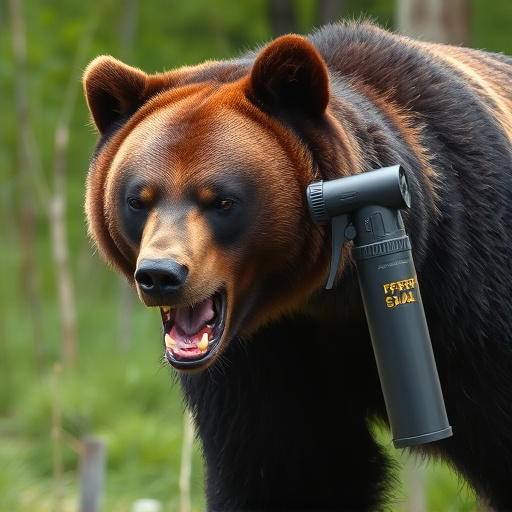Bears, especially grizzlies, pose risks to campers due to their power and unpredictability. Understanding bear behavior is crucial; bears may charge when threatened, surprised, or protecting cubs. Bear spray, a non-lethal deterrent, uses capsicum chemicals to temporarily disorient bears, but its effectiveness against charging grizzlies is limited by their thick fur. Specialized deterrents or alternative tools like noise makers or pepper ball guns offer enhanced protection against aggressive grizzlies. Proper use of bear spray involves aiming for the bear's face and chest at close range (20-30 feet) with a pulsing action, and it should be used as a last resort when escape routes are blocked.
“Enhancing your camping experience and ensuring safety in bear country is paramount, especially with increasing encounters. This comprehensive guide explores the essentiality of bear repellent spray for campers. We delve into understanding bear behavior, particularly aggressive charging instances, and how bear spray can deter these threats effectively. Learn about the science behind bear spray, its application, and key considerations when choosing the right product. Discover safety tips and crucial distinctions between using bear spray and dealing with charging grizzly bears.”
- Understanding Bear Behavior: When and Why They Charge
- What Is Bear Spray and How Does It Work?
- Choosing the Right Bear Repellent Spray for Camping
- Usage Tips and Safety Precautions: Bear Spray vs. Charging Grizzly Bears
Understanding Bear Behavior: When and Why They Charge
Bears, especially grizzlies, are powerful and unpredictable animals that can make camping in their habitats a risky endeavor. Understanding bear behavior is crucial for campers to know when and why bears might charge. Bear spray, a popular deterrent among campers, has proven to be effective against both black bears and grizzlies. When used correctly, it creates a barrier of chemical irritants that temporarily blinds and disorients the bear, providing an escape route.
However, it’s essential to recognize that not all bear encounters result in a charge. Bears often charge when they feel threatened, surprised, or if they have cubs nearby. During mating season, males may also charge as part of their territorial behavior. Knowing these triggers can help campers take preventive measures, such as making noise while walking through bear country, keeping food securely stored, and avoiding known bear paths to minimize the risk of an aggressive encounter with a charging grizzly versus a less aggressive response from other bear species.
What Is Bear Spray and How Does It Work?
Bear spray, also known as bear repellent spray, is a powerful tool designed to deter and protect against aggressive bears while camping or hiking in bear country. It’s an essential item for anyone venturing into areas inhabited by grizzly bears or black bears. Unlike traditional firearms, which may not always be reliable or practical in close encounters, bear spray offers a non-lethal means of self-defense.
When used correctly, bear spray creates a barrier between the user and the bear by releasing a potent combination of capsicum (the active ingredient found in chili peppers) and other chemicals. This irritates the bear’s eyes, nose, and respiratory system, causing it to retreat. In contrast, “charging” grizzlies, where bears aggressively charge at humans, often results in severe injury or death due to their immense strength. Bear spray provides a safer alternative by enabling individuals to avoid such confrontations and escape potentially dangerous situations.
Choosing the Right Bear Repellent Spray for Camping
When considering essential camping gear, bear repellent spray is at the top of the list for safety and peace of mind in grizzly or black bear country. The key to choosing the right one lies in understanding the difference between bear spray and its effectiveness against charging grizzlies.
Bear spray is designed to create a barrier of capsicum-based chemicals that irritate a bear’s eyes, nose, and throat, causing it to avoid the area. It’s highly effective for deterring defensive bears or those with cubs. However, when faced with an aggressive charging grizzly, bear spray might not be enough. Grizzlies have a thick fur coat and higher tolerance to capsaicin, making them less responsive to typical bear sprays. For protection against charging grizzlies, consider specialized bear deterrents that use stronger concentrations of active ingredients or alternative methods like noise makers or pepper ball guns.
Usage Tips and Safety Precautions: Bear Spray vs. Charging Grizzly Bears
When it comes to protecting yourself from a potential bear encounter while camping, understanding the difference between bear spray and how to use it effectively is crucial. Bear spray, also known as bear repellent, is a powerful tool when used correctly. Unlike the misconception that spraying can startle a grizzly and cause it to flee, bear spray vs. charging grizzly bears is not so straightforward. In reality, bear spray desensitizes the animal temporarily, making it less likely to attack. It does this by irritating the bear’s eyes, nose, and lungs, causing it to retreat rather than charge.
The key to success with bear spray lies in its proper usage. Always keep the can upright and pointed away from you; never spray towards yourself or other people. Aim for the bear’s face and chest at close range (about 20-30 feet). A good pulsing action, similar to shaking a can of bug spray, ensures the active ingredients reach the bear effectively. Remember, if you encounter a charging grizzly bear, do not run; instead, use your spray as a last resort when all other escape routes are cut off.
When it comes to camping in bear country, understanding their behavior and knowing how to respond is vital. Bear spray has proven to be an effective deterrent against both black bears and grizzlies, but its success depends on proper usage. By choosing the right spray and following safety precautions, campers can significantly reduce the risk of a charged encounter. While bear spray isn’t a guarantee against attacks, it offers a crucial layer of protection in unpredictable situations, especially when faced with charging grizzly bears.
